Analyzing Business Ethics in Global Perspective: Assignment
VerifiedAdded on 2020/05/16
|12
|3110
|276
Essay
AI Summary
This essay analyzes the significance of cross-cultural communication in a global business environment, emphasizing its ethical dimensions. It addresses key questions regarding the challenges and opportunities arising from globalization, such as the need for multilingual flexibility and effective internal communication to navigate external threats. The essay explores ethical issues related to cultural barriers, the importance of individual differences over cultural adaptation, and the competitive advantages gained by companies adept at cross-cultural communication. It contrasts communication styles between different countries, provides examples of how individual differences can negatively impact business growth, and justifies the detrimental effects of stereotypes. The essay references the article "The Rising Importance of Cross Cultural Communication in Global Business Scenario" and highlights the importance of cultural proficiency, the significance of internal communication, and the need for organizations to adapt to a diverse global landscape. The essay stresses the importance of understanding and adapting to individual differences to enhance business performance and success.
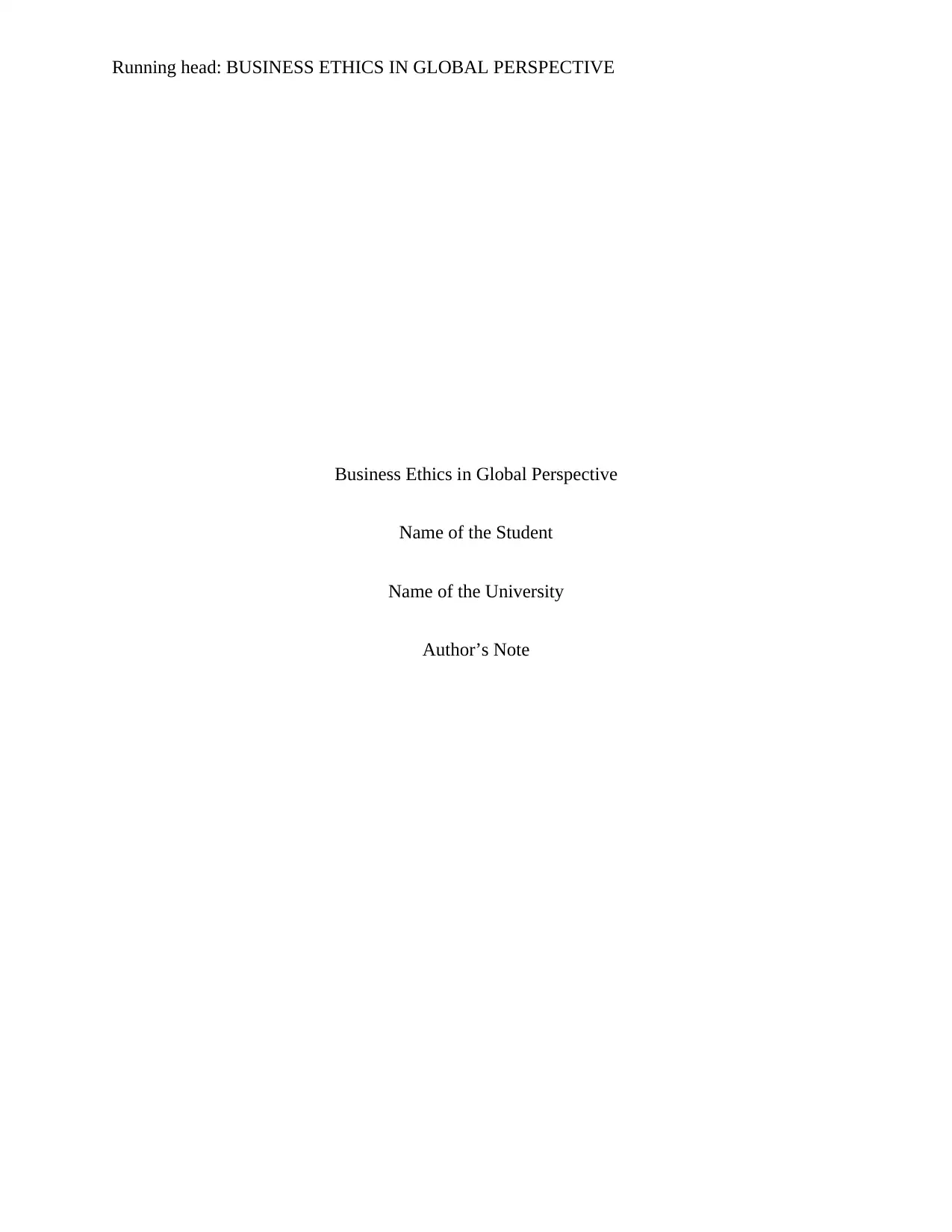
Running head: BUSINESS ETHICS IN GLOBAL PERSPECTIVE
Business Ethics in Global Perspective
Name of the Student
Name of the University
Author’s Note
Business Ethics in Global Perspective
Name of the Student
Name of the University
Author’s Note
Paraphrase This Document
Need a fresh take? Get an instant paraphrase of this document with our AI Paraphraser
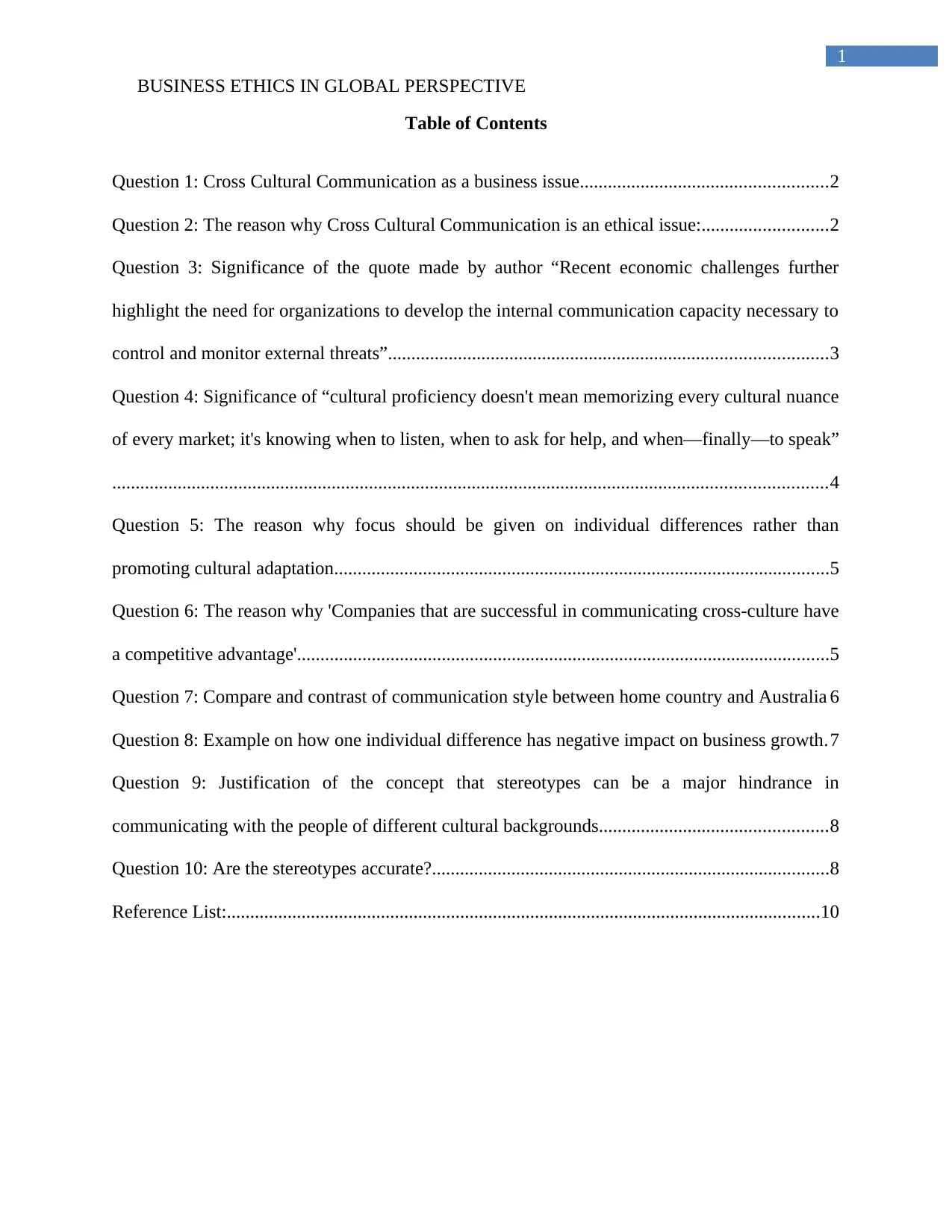
1
BUSINESS ETHICS IN GLOBAL PERSPECTIVE
Table of Contents
Question 1: Cross Cultural Communication as a business issue.....................................................2
Question 2: The reason why Cross Cultural Communication is an ethical issue:...........................2
Question 3: Significance of the quote made by author “Recent economic challenges further
highlight the need for organizations to develop the internal communication capacity necessary to
control and monitor external threats”..............................................................................................3
Question 4: Significance of “cultural proficiency doesn't mean memorizing every cultural nuance
of every market; it's knowing when to listen, when to ask for help, and when—finally—to speak”
.........................................................................................................................................................4
Question 5: The reason why focus should be given on individual differences rather than
promoting cultural adaptation..........................................................................................................5
Question 6: The reason why 'Companies that are successful in communicating cross-culture have
a competitive advantage'..................................................................................................................5
Question 7: Compare and contrast of communication style between home country and Australia 6
Question 8: Example on how one individual difference has negative impact on business growth.7
Question 9: Justification of the concept that stereotypes can be a major hindrance in
communicating with the people of different cultural backgrounds.................................................8
Question 10: Are the stereotypes accurate?.....................................................................................8
Reference List:...............................................................................................................................10
BUSINESS ETHICS IN GLOBAL PERSPECTIVE
Table of Contents
Question 1: Cross Cultural Communication as a business issue.....................................................2
Question 2: The reason why Cross Cultural Communication is an ethical issue:...........................2
Question 3: Significance of the quote made by author “Recent economic challenges further
highlight the need for organizations to develop the internal communication capacity necessary to
control and monitor external threats”..............................................................................................3
Question 4: Significance of “cultural proficiency doesn't mean memorizing every cultural nuance
of every market; it's knowing when to listen, when to ask for help, and when—finally—to speak”
.........................................................................................................................................................4
Question 5: The reason why focus should be given on individual differences rather than
promoting cultural adaptation..........................................................................................................5
Question 6: The reason why 'Companies that are successful in communicating cross-culture have
a competitive advantage'..................................................................................................................5
Question 7: Compare and contrast of communication style between home country and Australia 6
Question 8: Example on how one individual difference has negative impact on business growth.7
Question 9: Justification of the concept that stereotypes can be a major hindrance in
communicating with the people of different cultural backgrounds.................................................8
Question 10: Are the stereotypes accurate?.....................................................................................8
Reference List:...............................................................................................................................10
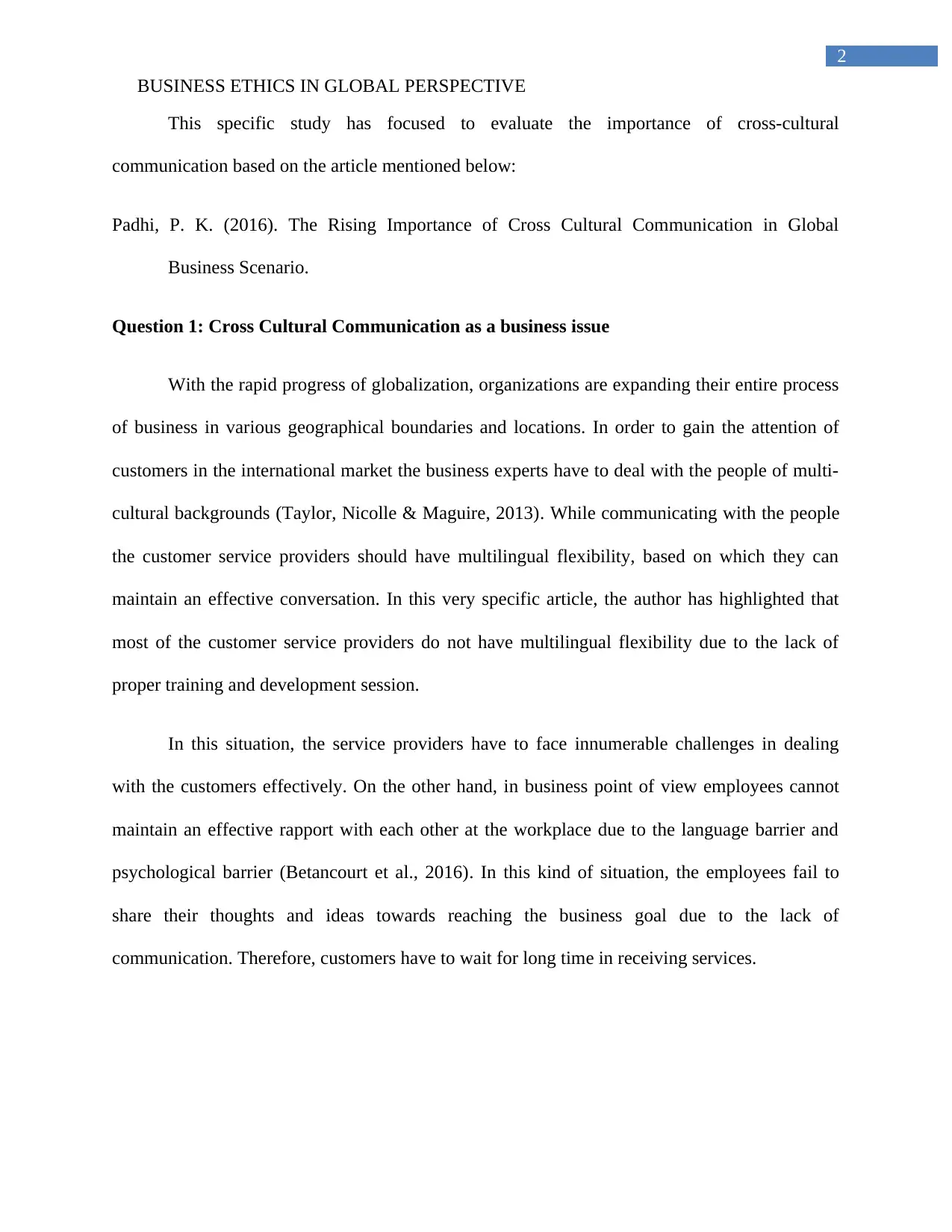
2
BUSINESS ETHICS IN GLOBAL PERSPECTIVE
This specific study has focused to evaluate the importance of cross-cultural
communication based on the article mentioned below:
Padhi, P. K. (2016). The Rising Importance of Cross Cultural Communication in Global
Business Scenario.
Question 1: Cross Cultural Communication as a business issue
With the rapid progress of globalization, organizations are expanding their entire process
of business in various geographical boundaries and locations. In order to gain the attention of
customers in the international market the business experts have to deal with the people of multi-
cultural backgrounds (Taylor, Nicolle & Maguire, 2013). While communicating with the people
the customer service providers should have multilingual flexibility, based on which they can
maintain an effective conversation. In this very specific article, the author has highlighted that
most of the customer service providers do not have multilingual flexibility due to the lack of
proper training and development session.
In this situation, the service providers have to face innumerable challenges in dealing
with the customers effectively. On the other hand, in business point of view employees cannot
maintain an effective rapport with each other at the workplace due to the language barrier and
psychological barrier (Betancourt et al., 2016). In this kind of situation, the employees fail to
share their thoughts and ideas towards reaching the business goal due to the lack of
communication. Therefore, customers have to wait for long time in receiving services.
BUSINESS ETHICS IN GLOBAL PERSPECTIVE
This specific study has focused to evaluate the importance of cross-cultural
communication based on the article mentioned below:
Padhi, P. K. (2016). The Rising Importance of Cross Cultural Communication in Global
Business Scenario.
Question 1: Cross Cultural Communication as a business issue
With the rapid progress of globalization, organizations are expanding their entire process
of business in various geographical boundaries and locations. In order to gain the attention of
customers in the international market the business experts have to deal with the people of multi-
cultural backgrounds (Taylor, Nicolle & Maguire, 2013). While communicating with the people
the customer service providers should have multilingual flexibility, based on which they can
maintain an effective conversation. In this very specific article, the author has highlighted that
most of the customer service providers do not have multilingual flexibility due to the lack of
proper training and development session.
In this situation, the service providers have to face innumerable challenges in dealing
with the customers effectively. On the other hand, in business point of view employees cannot
maintain an effective rapport with each other at the workplace due to the language barrier and
psychological barrier (Betancourt et al., 2016). In this kind of situation, the employees fail to
share their thoughts and ideas towards reaching the business goal due to the lack of
communication. Therefore, customers have to wait for long time in receiving services.
⊘ This is a preview!⊘
Do you want full access?
Subscribe today to unlock all pages.

Trusted by 1+ million students worldwide
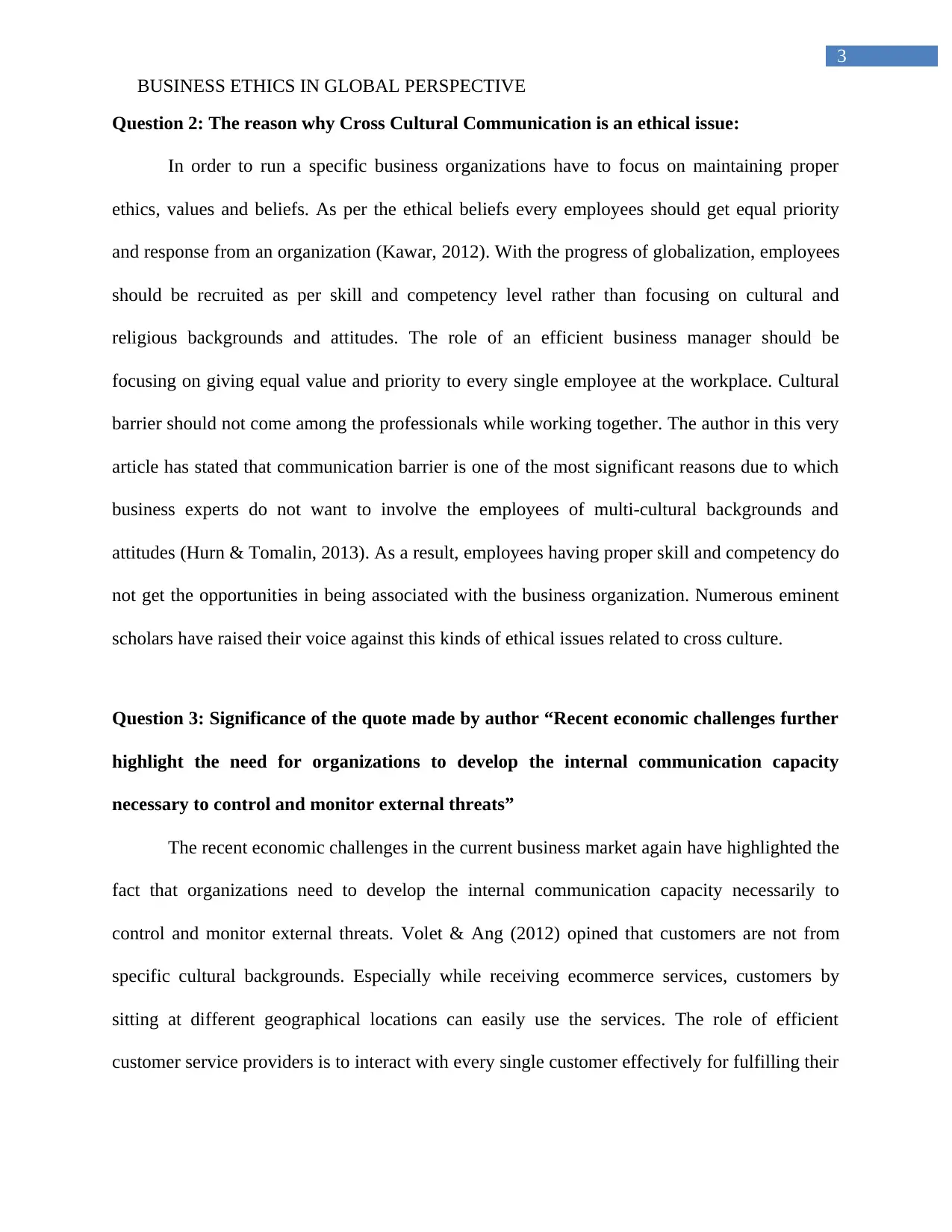
3
BUSINESS ETHICS IN GLOBAL PERSPECTIVE
Question 2: The reason why Cross Cultural Communication is an ethical issue:
In order to run a specific business organizations have to focus on maintaining proper
ethics, values and beliefs. As per the ethical beliefs every employees should get equal priority
and response from an organization (Kawar, 2012). With the progress of globalization, employees
should be recruited as per skill and competency level rather than focusing on cultural and
religious backgrounds and attitudes. The role of an efficient business manager should be
focusing on giving equal value and priority to every single employee at the workplace. Cultural
barrier should not come among the professionals while working together. The author in this very
article has stated that communication barrier is one of the most significant reasons due to which
business experts do not want to involve the employees of multi-cultural backgrounds and
attitudes (Hurn & Tomalin, 2013). As a result, employees having proper skill and competency do
not get the opportunities in being associated with the business organization. Numerous eminent
scholars have raised their voice against this kinds of ethical issues related to cross culture.
Question 3: Significance of the quote made by author “Recent economic challenges further
highlight the need for organizations to develop the internal communication capacity
necessary to control and monitor external threats”
The recent economic challenges in the current business market again have highlighted the
fact that organizations need to develop the internal communication capacity necessarily to
control and monitor external threats. Volet & Ang (2012) opined that customers are not from
specific cultural backgrounds. Especially while receiving ecommerce services, customers by
sitting at different geographical locations can easily use the services. The role of efficient
customer service providers is to interact with every single customer effectively for fulfilling their
BUSINESS ETHICS IN GLOBAL PERSPECTIVE
Question 2: The reason why Cross Cultural Communication is an ethical issue:
In order to run a specific business organizations have to focus on maintaining proper
ethics, values and beliefs. As per the ethical beliefs every employees should get equal priority
and response from an organization (Kawar, 2012). With the progress of globalization, employees
should be recruited as per skill and competency level rather than focusing on cultural and
religious backgrounds and attitudes. The role of an efficient business manager should be
focusing on giving equal value and priority to every single employee at the workplace. Cultural
barrier should not come among the professionals while working together. The author in this very
article has stated that communication barrier is one of the most significant reasons due to which
business experts do not want to involve the employees of multi-cultural backgrounds and
attitudes (Hurn & Tomalin, 2013). As a result, employees having proper skill and competency do
not get the opportunities in being associated with the business organization. Numerous eminent
scholars have raised their voice against this kinds of ethical issues related to cross culture.
Question 3: Significance of the quote made by author “Recent economic challenges further
highlight the need for organizations to develop the internal communication capacity
necessary to control and monitor external threats”
The recent economic challenges in the current business market again have highlighted the
fact that organizations need to develop the internal communication capacity necessarily to
control and monitor external threats. Volet & Ang (2012) opined that customers are not from
specific cultural backgrounds. Especially while receiving ecommerce services, customers by
sitting at different geographical locations can easily use the services. The role of efficient
customer service providers is to interact with every single customer effectively for fulfilling their
Paraphrase This Document
Need a fresh take? Get an instant paraphrase of this document with our AI Paraphraser
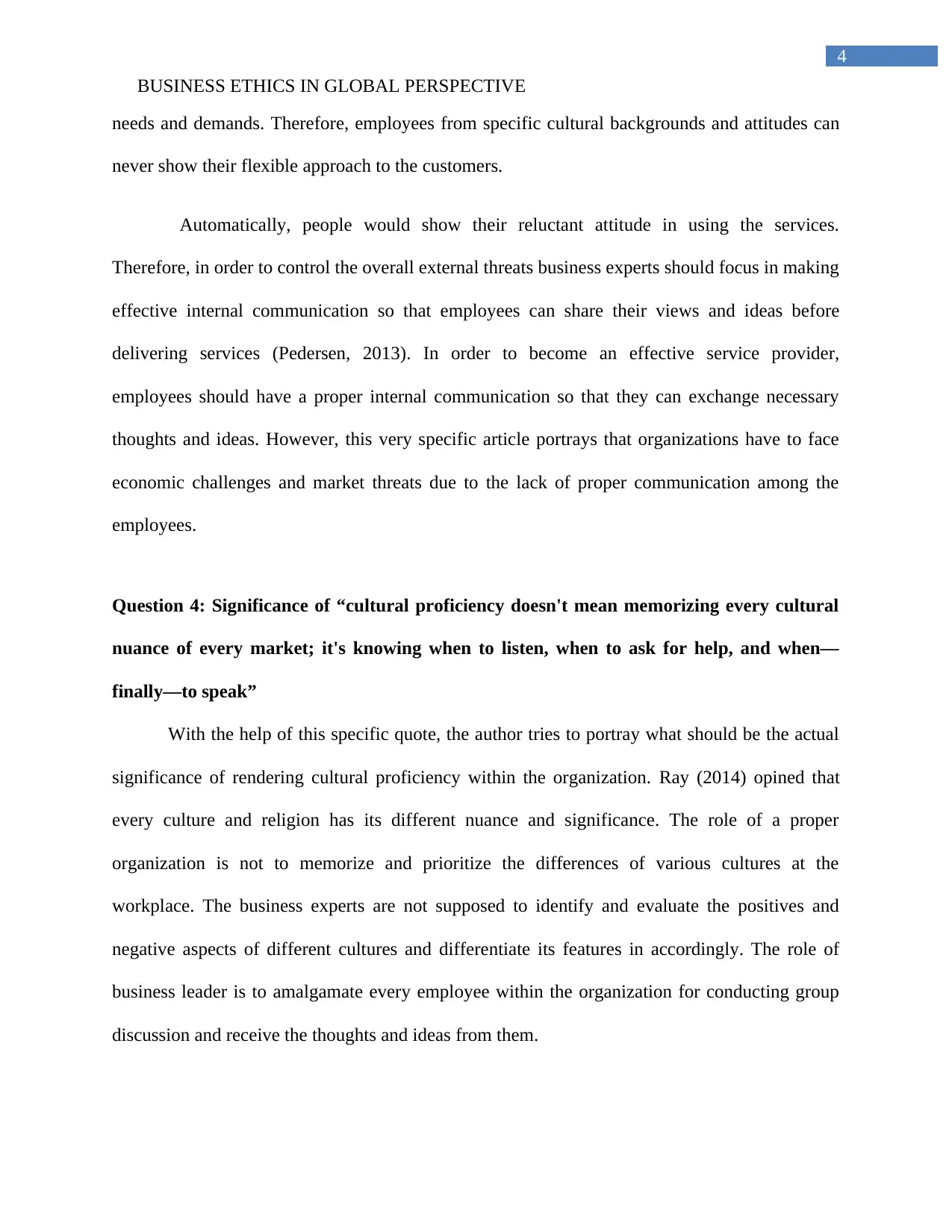
4
BUSINESS ETHICS IN GLOBAL PERSPECTIVE
needs and demands. Therefore, employees from specific cultural backgrounds and attitudes can
never show their flexible approach to the customers.
Automatically, people would show their reluctant attitude in using the services.
Therefore, in order to control the overall external threats business experts should focus in making
effective internal communication so that employees can share their views and ideas before
delivering services (Pedersen, 2013). In order to become an effective service provider,
employees should have a proper internal communication so that they can exchange necessary
thoughts and ideas. However, this very specific article portrays that organizations have to face
economic challenges and market threats due to the lack of proper communication among the
employees.
Question 4: Significance of “cultural proficiency doesn't mean memorizing every cultural
nuance of every market; it's knowing when to listen, when to ask for help, and when—
finally—to speak”
With the help of this specific quote, the author tries to portray what should be the actual
significance of rendering cultural proficiency within the organization. Ray (2014) opined that
every culture and religion has its different nuance and significance. The role of a proper
organization is not to memorize and prioritize the differences of various cultures at the
workplace. The business experts are not supposed to identify and evaluate the positives and
negative aspects of different cultures and differentiate its features in accordingly. The role of
business leader is to amalgamate every employee within the organization for conducting group
discussion and receive the thoughts and ideas from them.
BUSINESS ETHICS IN GLOBAL PERSPECTIVE
needs and demands. Therefore, employees from specific cultural backgrounds and attitudes can
never show their flexible approach to the customers.
Automatically, people would show their reluctant attitude in using the services.
Therefore, in order to control the overall external threats business experts should focus in making
effective internal communication so that employees can share their views and ideas before
delivering services (Pedersen, 2013). In order to become an effective service provider,
employees should have a proper internal communication so that they can exchange necessary
thoughts and ideas. However, this very specific article portrays that organizations have to face
economic challenges and market threats due to the lack of proper communication among the
employees.
Question 4: Significance of “cultural proficiency doesn't mean memorizing every cultural
nuance of every market; it's knowing when to listen, when to ask for help, and when—
finally—to speak”
With the help of this specific quote, the author tries to portray what should be the actual
significance of rendering cultural proficiency within the organization. Ray (2014) opined that
every culture and religion has its different nuance and significance. The role of a proper
organization is not to memorize and prioritize the differences of various cultures at the
workplace. The business experts are not supposed to identify and evaluate the positives and
negative aspects of different cultures and differentiate its features in accordingly. The role of
business leader is to amalgamate every employee within the organization for conducting group
discussion and receive the thoughts and ideas from them.
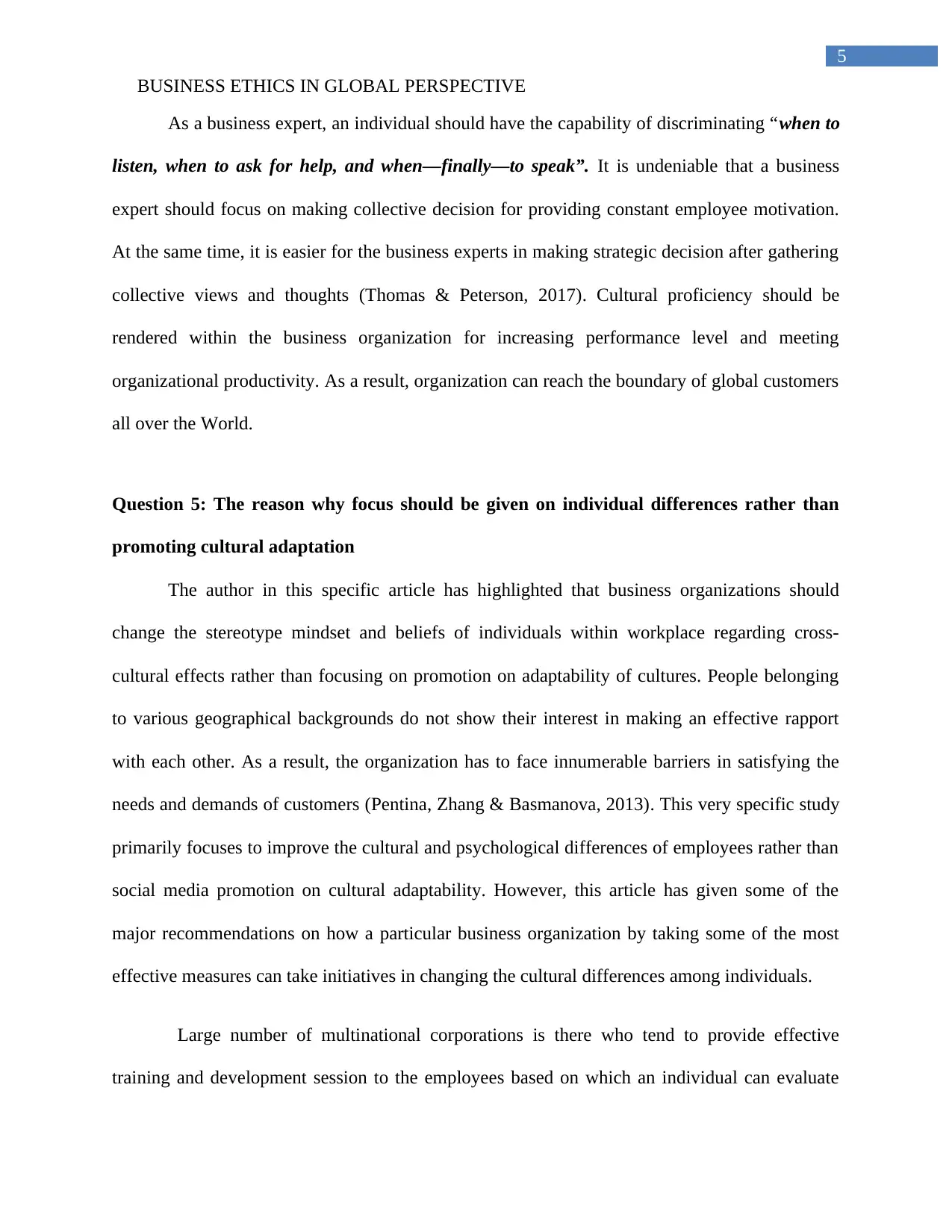
5
BUSINESS ETHICS IN GLOBAL PERSPECTIVE
As a business expert, an individual should have the capability of discriminating “when to
listen, when to ask for help, and when—finally—to speak”. It is undeniable that a business
expert should focus on making collective decision for providing constant employee motivation.
At the same time, it is easier for the business experts in making strategic decision after gathering
collective views and thoughts (Thomas & Peterson, 2017). Cultural proficiency should be
rendered within the business organization for increasing performance level and meeting
organizational productivity. As a result, organization can reach the boundary of global customers
all over the World.
Question 5: The reason why focus should be given on individual differences rather than
promoting cultural adaptation
The author in this specific article has highlighted that business organizations should
change the stereotype mindset and beliefs of individuals within workplace regarding cross-
cultural effects rather than focusing on promotion on adaptability of cultures. People belonging
to various geographical backgrounds do not show their interest in making an effective rapport
with each other. As a result, the organization has to face innumerable barriers in satisfying the
needs and demands of customers (Pentina, Zhang & Basmanova, 2013). This very specific study
primarily focuses to improve the cultural and psychological differences of employees rather than
social media promotion on cultural adaptability. However, this article has given some of the
major recommendations on how a particular business organization by taking some of the most
effective measures can take initiatives in changing the cultural differences among individuals.
Large number of multinational corporations is there who tend to provide effective
training and development session to the employees based on which an individual can evaluate
BUSINESS ETHICS IN GLOBAL PERSPECTIVE
As a business expert, an individual should have the capability of discriminating “when to
listen, when to ask for help, and when—finally—to speak”. It is undeniable that a business
expert should focus on making collective decision for providing constant employee motivation.
At the same time, it is easier for the business experts in making strategic decision after gathering
collective views and thoughts (Thomas & Peterson, 2017). Cultural proficiency should be
rendered within the business organization for increasing performance level and meeting
organizational productivity. As a result, organization can reach the boundary of global customers
all over the World.
Question 5: The reason why focus should be given on individual differences rather than
promoting cultural adaptation
The author in this specific article has highlighted that business organizations should
change the stereotype mindset and beliefs of individuals within workplace regarding cross-
cultural effects rather than focusing on promotion on adaptability of cultures. People belonging
to various geographical backgrounds do not show their interest in making an effective rapport
with each other. As a result, the organization has to face innumerable barriers in satisfying the
needs and demands of customers (Pentina, Zhang & Basmanova, 2013). This very specific study
primarily focuses to improve the cultural and psychological differences of employees rather than
social media promotion on cultural adaptability. However, this article has given some of the
major recommendations on how a particular business organization by taking some of the most
effective measures can take initiatives in changing the cultural differences among individuals.
Large number of multinational corporations is there who tend to provide effective
training and development session to the employees based on which an individual can evaluate
⊘ This is a preview!⊘
Do you want full access?
Subscribe today to unlock all pages.

Trusted by 1+ million students worldwide
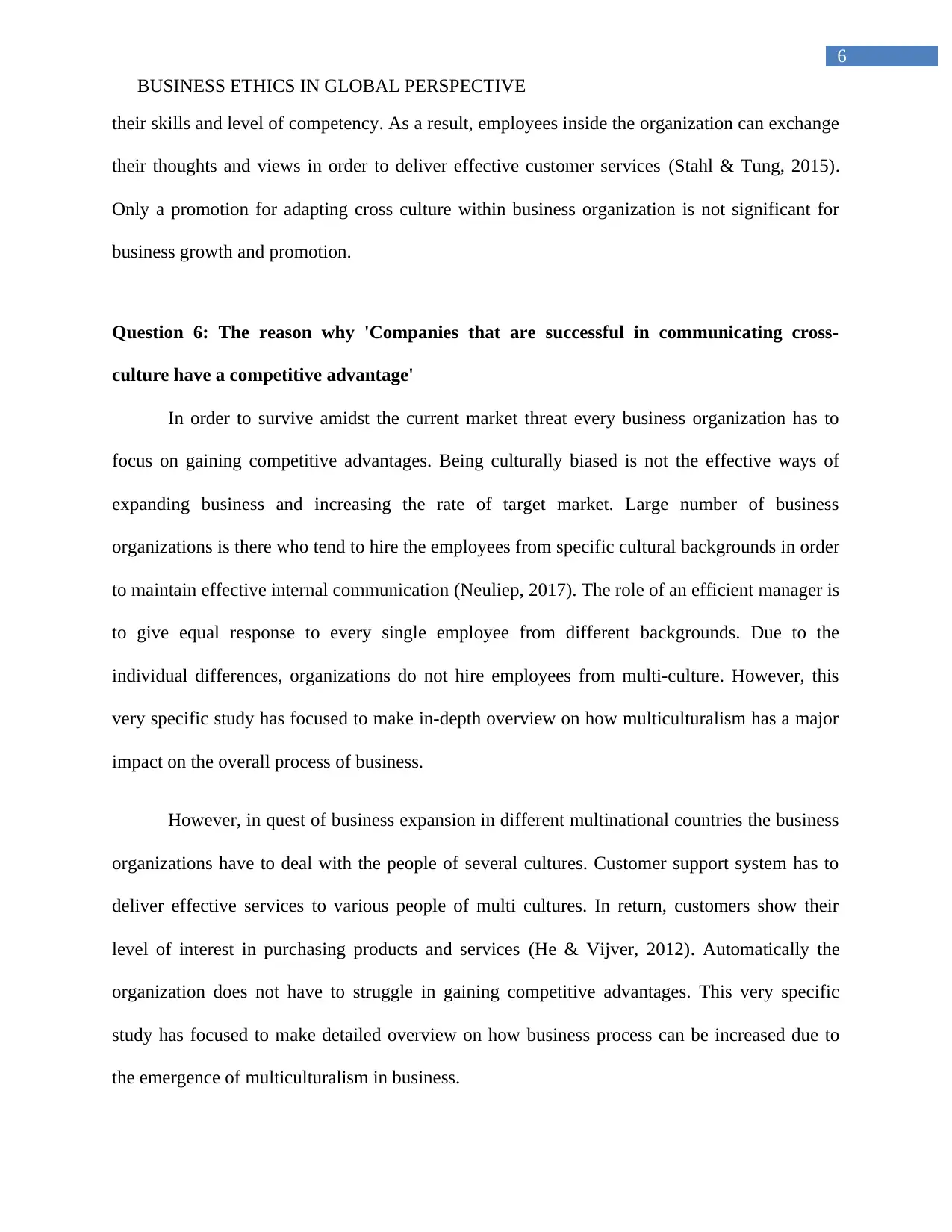
6
BUSINESS ETHICS IN GLOBAL PERSPECTIVE
their skills and level of competency. As a result, employees inside the organization can exchange
their thoughts and views in order to deliver effective customer services (Stahl & Tung, 2015).
Only a promotion for adapting cross culture within business organization is not significant for
business growth and promotion.
Question 6: The reason why 'Companies that are successful in communicating cross-
culture have a competitive advantage'
In order to survive amidst the current market threat every business organization has to
focus on gaining competitive advantages. Being culturally biased is not the effective ways of
expanding business and increasing the rate of target market. Large number of business
organizations is there who tend to hire the employees from specific cultural backgrounds in order
to maintain effective internal communication (Neuliep, 2017). The role of an efficient manager is
to give equal response to every single employee from different backgrounds. Due to the
individual differences, organizations do not hire employees from multi-culture. However, this
very specific study has focused to make in-depth overview on how multiculturalism has a major
impact on the overall process of business.
However, in quest of business expansion in different multinational countries the business
organizations have to deal with the people of several cultures. Customer support system has to
deliver effective services to various people of multi cultures. In return, customers show their
level of interest in purchasing products and services (He & Vijver, 2012). Automatically the
organization does not have to struggle in gaining competitive advantages. This very specific
study has focused to make detailed overview on how business process can be increased due to
the emergence of multiculturalism in business.
BUSINESS ETHICS IN GLOBAL PERSPECTIVE
their skills and level of competency. As a result, employees inside the organization can exchange
their thoughts and views in order to deliver effective customer services (Stahl & Tung, 2015).
Only a promotion for adapting cross culture within business organization is not significant for
business growth and promotion.
Question 6: The reason why 'Companies that are successful in communicating cross-
culture have a competitive advantage'
In order to survive amidst the current market threat every business organization has to
focus on gaining competitive advantages. Being culturally biased is not the effective ways of
expanding business and increasing the rate of target market. Large number of business
organizations is there who tend to hire the employees from specific cultural backgrounds in order
to maintain effective internal communication (Neuliep, 2017). The role of an efficient manager is
to give equal response to every single employee from different backgrounds. Due to the
individual differences, organizations do not hire employees from multi-culture. However, this
very specific study has focused to make in-depth overview on how multiculturalism has a major
impact on the overall process of business.
However, in quest of business expansion in different multinational countries the business
organizations have to deal with the people of several cultures. Customer support system has to
deliver effective services to various people of multi cultures. In return, customers show their
level of interest in purchasing products and services (He & Vijver, 2012). Automatically the
organization does not have to struggle in gaining competitive advantages. This very specific
study has focused to make detailed overview on how business process can be increased due to
the emergence of multiculturalism in business.
Paraphrase This Document
Need a fresh take? Get an instant paraphrase of this document with our AI Paraphraser
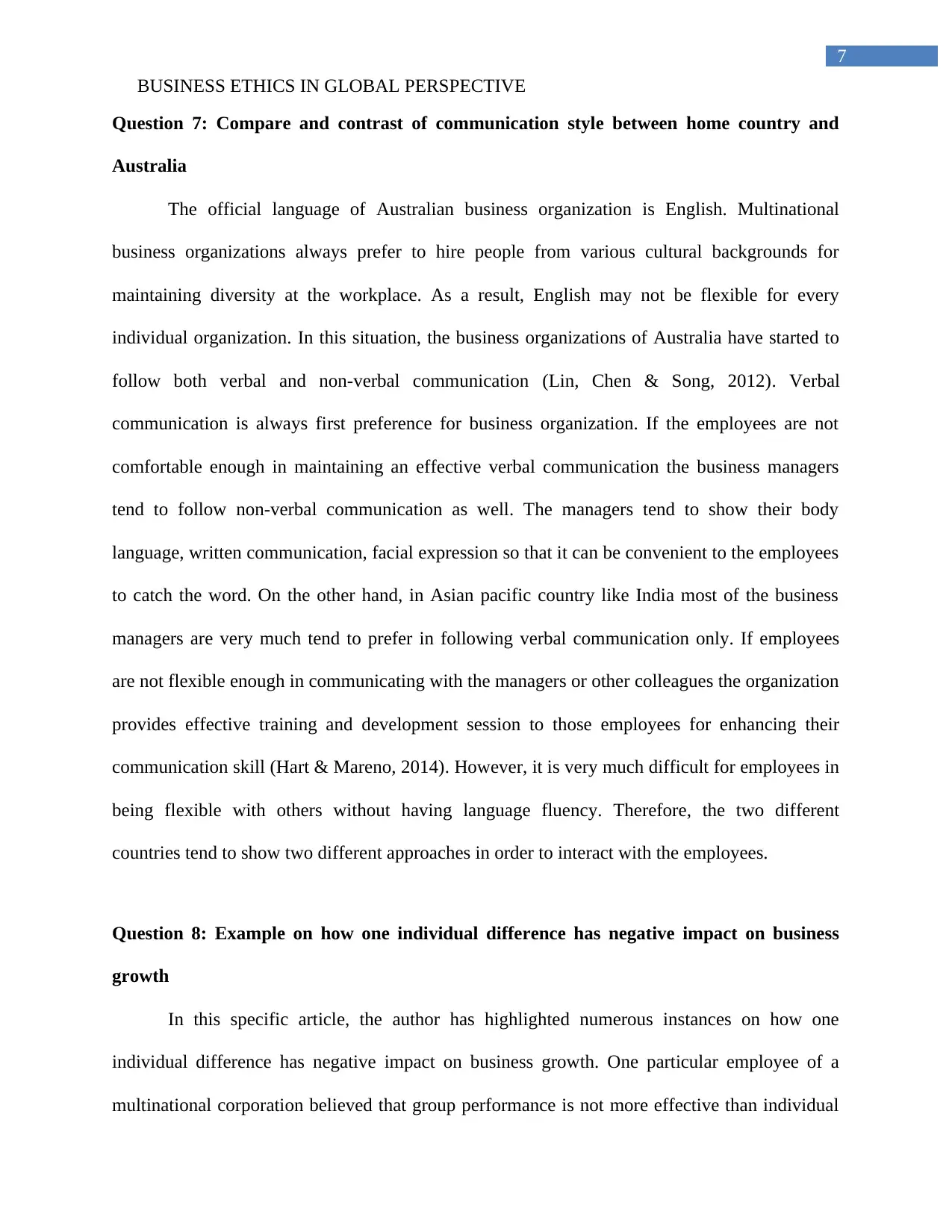
7
BUSINESS ETHICS IN GLOBAL PERSPECTIVE
Question 7: Compare and contrast of communication style between home country and
Australia
The official language of Australian business organization is English. Multinational
business organizations always prefer to hire people from various cultural backgrounds for
maintaining diversity at the workplace. As a result, English may not be flexible for every
individual organization. In this situation, the business organizations of Australia have started to
follow both verbal and non-verbal communication (Lin, Chen & Song, 2012). Verbal
communication is always first preference for business organization. If the employees are not
comfortable enough in maintaining an effective verbal communication the business managers
tend to follow non-verbal communication as well. The managers tend to show their body
language, written communication, facial expression so that it can be convenient to the employees
to catch the word. On the other hand, in Asian pacific country like India most of the business
managers are very much tend to prefer in following verbal communication only. If employees
are not flexible enough in communicating with the managers or other colleagues the organization
provides effective training and development session to those employees for enhancing their
communication skill (Hart & Mareno, 2014). However, it is very much difficult for employees in
being flexible with others without having language fluency. Therefore, the two different
countries tend to show two different approaches in order to interact with the employees.
Question 8: Example on how one individual difference has negative impact on business
growth
In this specific article, the author has highlighted numerous instances on how one
individual difference has negative impact on business growth. One particular employee of a
multinational corporation believed that group performance is not more effective than individual
BUSINESS ETHICS IN GLOBAL PERSPECTIVE
Question 7: Compare and contrast of communication style between home country and
Australia
The official language of Australian business organization is English. Multinational
business organizations always prefer to hire people from various cultural backgrounds for
maintaining diversity at the workplace. As a result, English may not be flexible for every
individual organization. In this situation, the business organizations of Australia have started to
follow both verbal and non-verbal communication (Lin, Chen & Song, 2012). Verbal
communication is always first preference for business organization. If the employees are not
comfortable enough in maintaining an effective verbal communication the business managers
tend to follow non-verbal communication as well. The managers tend to show their body
language, written communication, facial expression so that it can be convenient to the employees
to catch the word. On the other hand, in Asian pacific country like India most of the business
managers are very much tend to prefer in following verbal communication only. If employees
are not flexible enough in communicating with the managers or other colleagues the organization
provides effective training and development session to those employees for enhancing their
communication skill (Hart & Mareno, 2014). However, it is very much difficult for employees in
being flexible with others without having language fluency. Therefore, the two different
countries tend to show two different approaches in order to interact with the employees.
Question 8: Example on how one individual difference has negative impact on business
growth
In this specific article, the author has highlighted numerous instances on how one
individual difference has negative impact on business growth. One particular employee of a
multinational corporation believed that group performance is not more effective than individual
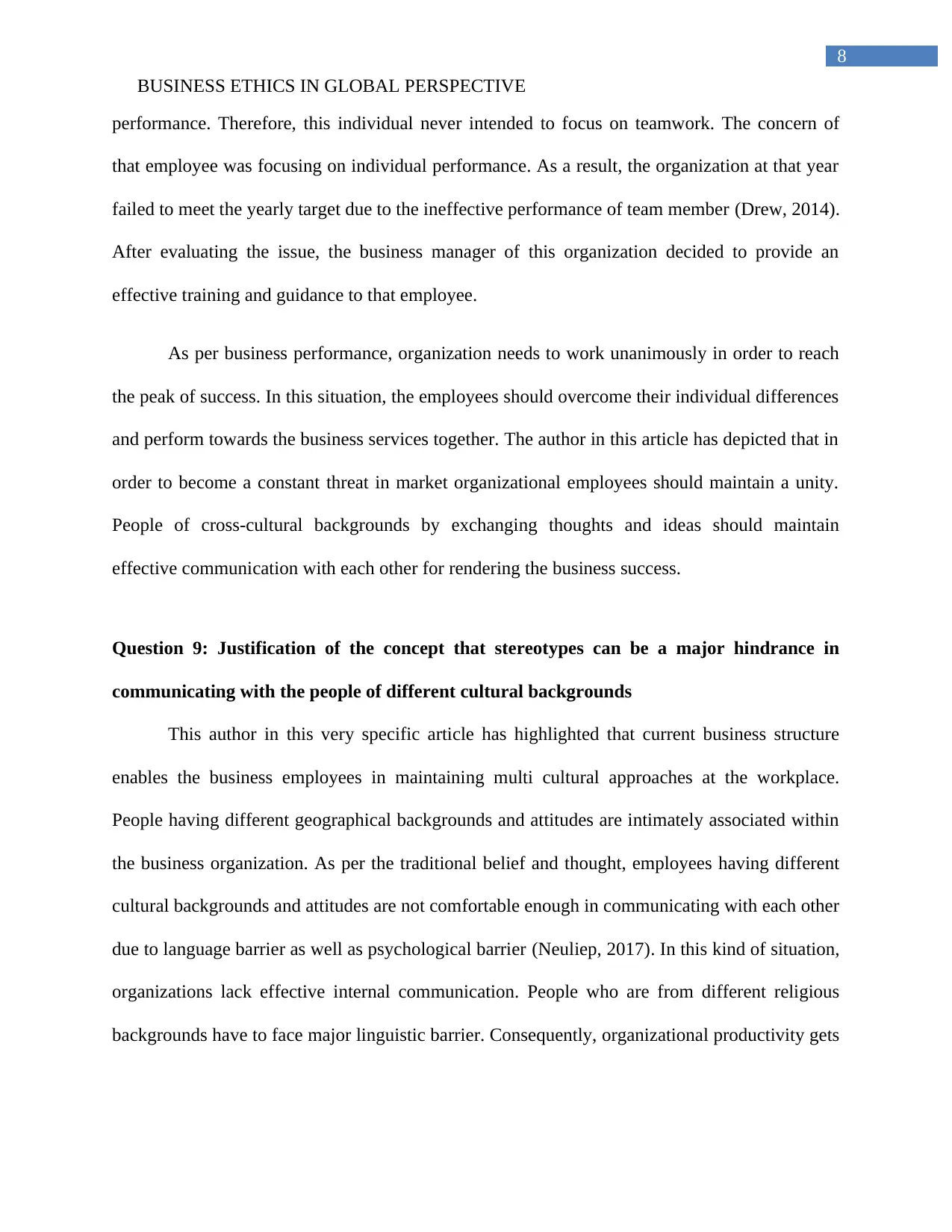
8
BUSINESS ETHICS IN GLOBAL PERSPECTIVE
performance. Therefore, this individual never intended to focus on teamwork. The concern of
that employee was focusing on individual performance. As a result, the organization at that year
failed to meet the yearly target due to the ineffective performance of team member (Drew, 2014).
After evaluating the issue, the business manager of this organization decided to provide an
effective training and guidance to that employee.
As per business performance, organization needs to work unanimously in order to reach
the peak of success. In this situation, the employees should overcome their individual differences
and perform towards the business services together. The author in this article has depicted that in
order to become a constant threat in market organizational employees should maintain a unity.
People of cross-cultural backgrounds by exchanging thoughts and ideas should maintain
effective communication with each other for rendering the business success.
Question 9: Justification of the concept that stereotypes can be a major hindrance in
communicating with the people of different cultural backgrounds
This author in this very specific article has highlighted that current business structure
enables the business employees in maintaining multi cultural approaches at the workplace.
People having different geographical backgrounds and attitudes are intimately associated within
the business organization. As per the traditional belief and thought, employees having different
cultural backgrounds and attitudes are not comfortable enough in communicating with each other
due to language barrier as well as psychological barrier (Neuliep, 2017). In this kind of situation,
organizations lack effective internal communication. People who are from different religious
backgrounds have to face major linguistic barrier. Consequently, organizational productivity gets
BUSINESS ETHICS IN GLOBAL PERSPECTIVE
performance. Therefore, this individual never intended to focus on teamwork. The concern of
that employee was focusing on individual performance. As a result, the organization at that year
failed to meet the yearly target due to the ineffective performance of team member (Drew, 2014).
After evaluating the issue, the business manager of this organization decided to provide an
effective training and guidance to that employee.
As per business performance, organization needs to work unanimously in order to reach
the peak of success. In this situation, the employees should overcome their individual differences
and perform towards the business services together. The author in this article has depicted that in
order to become a constant threat in market organizational employees should maintain a unity.
People of cross-cultural backgrounds by exchanging thoughts and ideas should maintain
effective communication with each other for rendering the business success.
Question 9: Justification of the concept that stereotypes can be a major hindrance in
communicating with the people of different cultural backgrounds
This author in this very specific article has highlighted that current business structure
enables the business employees in maintaining multi cultural approaches at the workplace.
People having different geographical backgrounds and attitudes are intimately associated within
the business organization. As per the traditional belief and thought, employees having different
cultural backgrounds and attitudes are not comfortable enough in communicating with each other
due to language barrier as well as psychological barrier (Neuliep, 2017). In this kind of situation,
organizations lack effective internal communication. People who are from different religious
backgrounds have to face major linguistic barrier. Consequently, organizational productivity gets
⊘ This is a preview!⊘
Do you want full access?
Subscribe today to unlock all pages.

Trusted by 1+ million students worldwide
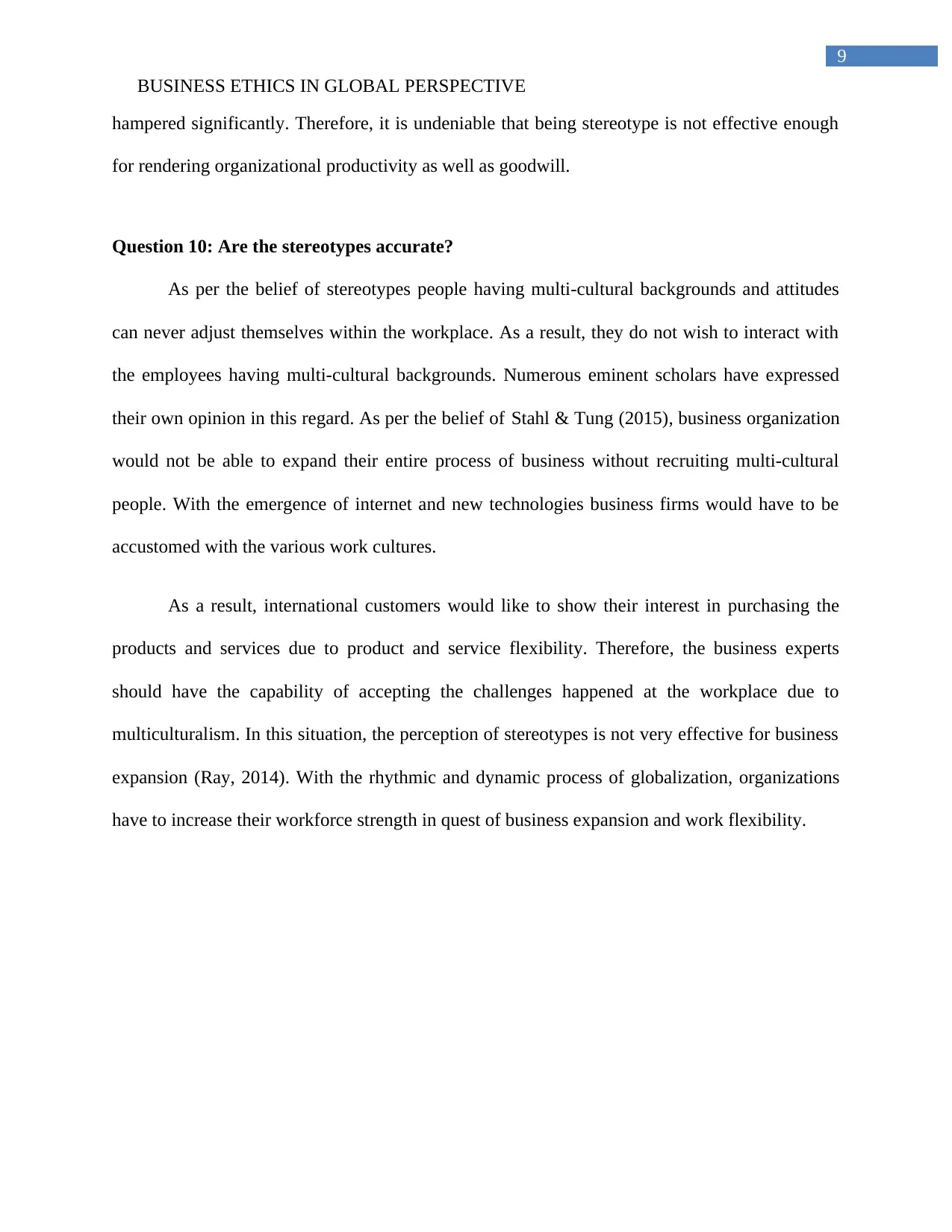
9
BUSINESS ETHICS IN GLOBAL PERSPECTIVE
hampered significantly. Therefore, it is undeniable that being stereotype is not effective enough
for rendering organizational productivity as well as goodwill.
Question 10: Are the stereotypes accurate?
As per the belief of stereotypes people having multi-cultural backgrounds and attitudes
can never adjust themselves within the workplace. As a result, they do not wish to interact with
the employees having multi-cultural backgrounds. Numerous eminent scholars have expressed
their own opinion in this regard. As per the belief of Stahl & Tung (2015), business organization
would not be able to expand their entire process of business without recruiting multi-cultural
people. With the emergence of internet and new technologies business firms would have to be
accustomed with the various work cultures.
As a result, international customers would like to show their interest in purchasing the
products and services due to product and service flexibility. Therefore, the business experts
should have the capability of accepting the challenges happened at the workplace due to
multiculturalism. In this situation, the perception of stereotypes is not very effective for business
expansion (Ray, 2014). With the rhythmic and dynamic process of globalization, organizations
have to increase their workforce strength in quest of business expansion and work flexibility.
BUSINESS ETHICS IN GLOBAL PERSPECTIVE
hampered significantly. Therefore, it is undeniable that being stereotype is not effective enough
for rendering organizational productivity as well as goodwill.
Question 10: Are the stereotypes accurate?
As per the belief of stereotypes people having multi-cultural backgrounds and attitudes
can never adjust themselves within the workplace. As a result, they do not wish to interact with
the employees having multi-cultural backgrounds. Numerous eminent scholars have expressed
their own opinion in this regard. As per the belief of Stahl & Tung (2015), business organization
would not be able to expand their entire process of business without recruiting multi-cultural
people. With the emergence of internet and new technologies business firms would have to be
accustomed with the various work cultures.
As a result, international customers would like to show their interest in purchasing the
products and services due to product and service flexibility. Therefore, the business experts
should have the capability of accepting the challenges happened at the workplace due to
multiculturalism. In this situation, the perception of stereotypes is not very effective for business
expansion (Ray, 2014). With the rhythmic and dynamic process of globalization, organizations
have to increase their workforce strength in quest of business expansion and work flexibility.
Paraphrase This Document
Need a fresh take? Get an instant paraphrase of this document with our AI Paraphraser
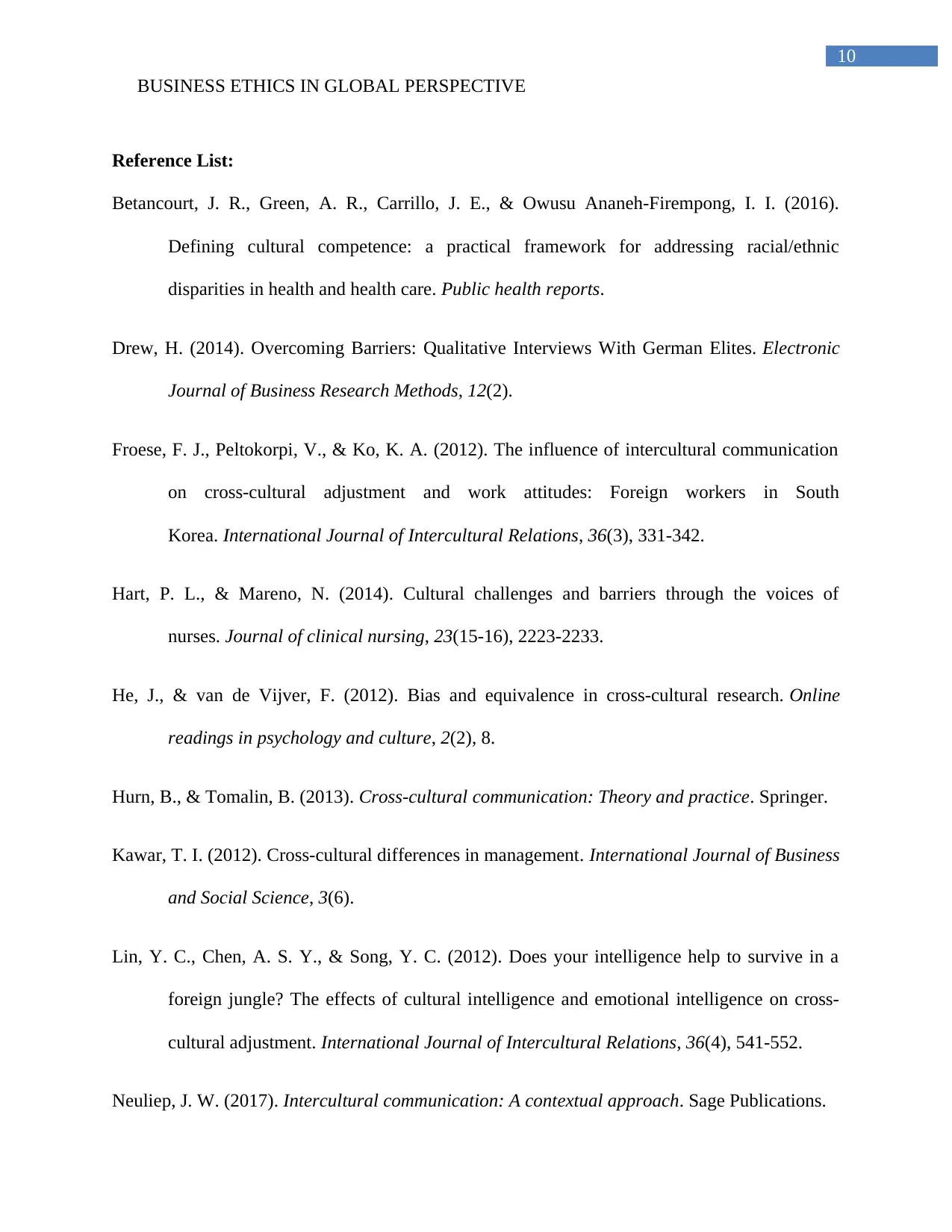
10
BUSINESS ETHICS IN GLOBAL PERSPECTIVE
Reference List:
Betancourt, J. R., Green, A. R., Carrillo, J. E., & Owusu Ananeh-Firempong, I. I. (2016).
Defining cultural competence: a practical framework for addressing racial/ethnic
disparities in health and health care. Public health reports.
Drew, H. (2014). Overcoming Barriers: Qualitative Interviews With German Elites. Electronic
Journal of Business Research Methods, 12(2).
Froese, F. J., Peltokorpi, V., & Ko, K. A. (2012). The influence of intercultural communication
on cross-cultural adjustment and work attitudes: Foreign workers in South
Korea. International Journal of Intercultural Relations, 36(3), 331-342.
Hart, P. L., & Mareno, N. (2014). Cultural challenges and barriers through the voices of
nurses. Journal of clinical nursing, 23(15-16), 2223-2233.
He, J., & van de Vijver, F. (2012). Bias and equivalence in cross-cultural research. Online
readings in psychology and culture, 2(2), 8.
Hurn, B., & Tomalin, B. (2013). Cross-cultural communication: Theory and practice. Springer.
Kawar, T. I. (2012). Cross-cultural differences in management. International Journal of Business
and Social Science, 3(6).
Lin, Y. C., Chen, A. S. Y., & Song, Y. C. (2012). Does your intelligence help to survive in a
foreign jungle? The effects of cultural intelligence and emotional intelligence on cross-
cultural adjustment. International Journal of Intercultural Relations, 36(4), 541-552.
Neuliep, J. W. (2017). Intercultural communication: A contextual approach. Sage Publications.
BUSINESS ETHICS IN GLOBAL PERSPECTIVE
Reference List:
Betancourt, J. R., Green, A. R., Carrillo, J. E., & Owusu Ananeh-Firempong, I. I. (2016).
Defining cultural competence: a practical framework for addressing racial/ethnic
disparities in health and health care. Public health reports.
Drew, H. (2014). Overcoming Barriers: Qualitative Interviews With German Elites. Electronic
Journal of Business Research Methods, 12(2).
Froese, F. J., Peltokorpi, V., & Ko, K. A. (2012). The influence of intercultural communication
on cross-cultural adjustment and work attitudes: Foreign workers in South
Korea. International Journal of Intercultural Relations, 36(3), 331-342.
Hart, P. L., & Mareno, N. (2014). Cultural challenges and barriers through the voices of
nurses. Journal of clinical nursing, 23(15-16), 2223-2233.
He, J., & van de Vijver, F. (2012). Bias and equivalence in cross-cultural research. Online
readings in psychology and culture, 2(2), 8.
Hurn, B., & Tomalin, B. (2013). Cross-cultural communication: Theory and practice. Springer.
Kawar, T. I. (2012). Cross-cultural differences in management. International Journal of Business
and Social Science, 3(6).
Lin, Y. C., Chen, A. S. Y., & Song, Y. C. (2012). Does your intelligence help to survive in a
foreign jungle? The effects of cultural intelligence and emotional intelligence on cross-
cultural adjustment. International Journal of Intercultural Relations, 36(4), 541-552.
Neuliep, J. W. (2017). Intercultural communication: A contextual approach. Sage Publications.
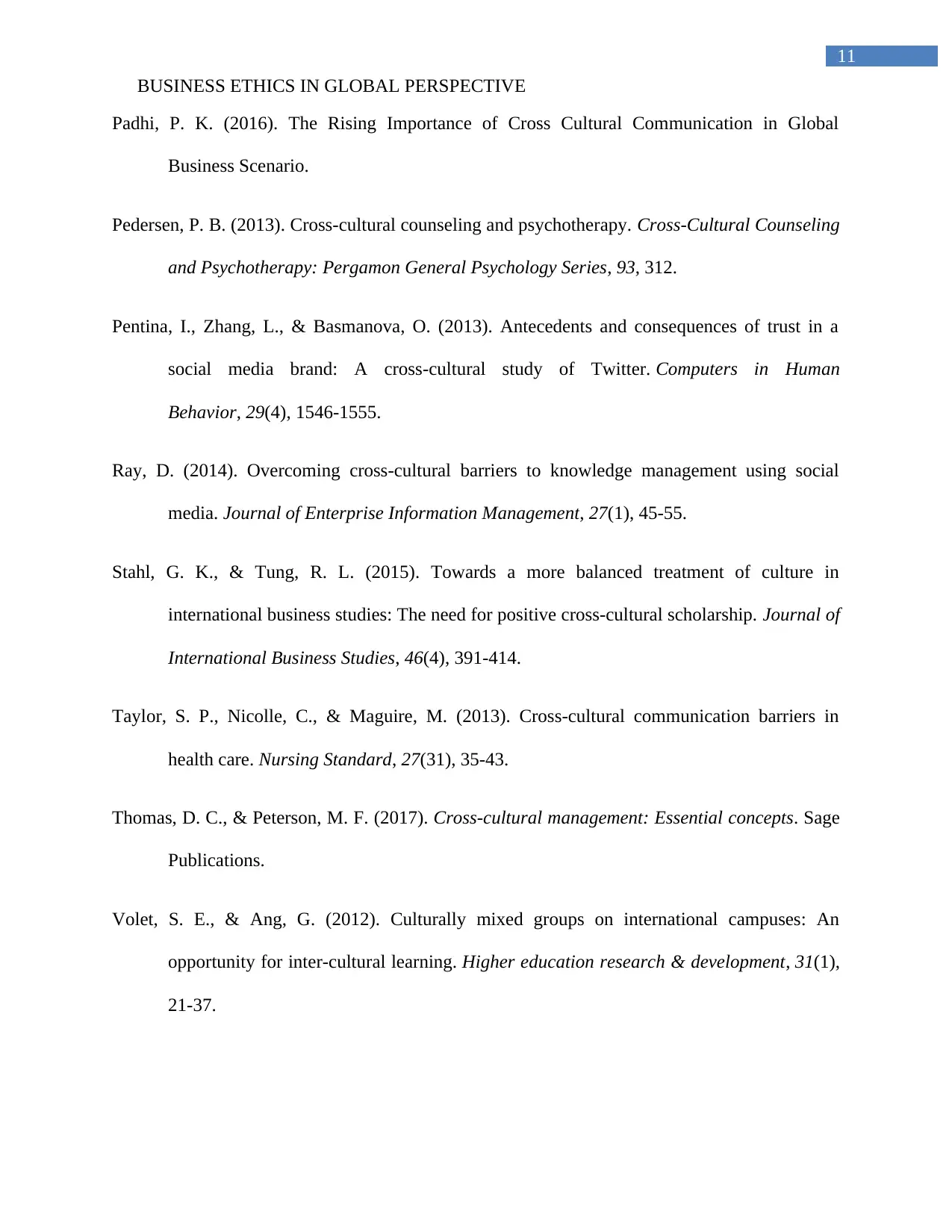
11
BUSINESS ETHICS IN GLOBAL PERSPECTIVE
Padhi, P. K. (2016). The Rising Importance of Cross Cultural Communication in Global
Business Scenario.
Pedersen, P. B. (2013). Cross-cultural counseling and psychotherapy. Cross-Cultural Counseling
and Psychotherapy: Pergamon General Psychology Series, 93, 312.
Pentina, I., Zhang, L., & Basmanova, O. (2013). Antecedents and consequences of trust in a
social media brand: A cross-cultural study of Twitter. Computers in Human
Behavior, 29(4), 1546-1555.
Ray, D. (2014). Overcoming cross-cultural barriers to knowledge management using social
media. Journal of Enterprise Information Management, 27(1), 45-55.
Stahl, G. K., & Tung, R. L. (2015). Towards a more balanced treatment of culture in
international business studies: The need for positive cross-cultural scholarship. Journal of
International Business Studies, 46(4), 391-414.
Taylor, S. P., Nicolle, C., & Maguire, M. (2013). Cross-cultural communication barriers in
health care. Nursing Standard, 27(31), 35-43.
Thomas, D. C., & Peterson, M. F. (2017). Cross-cultural management: Essential concepts. Sage
Publications.
Volet, S. E., & Ang, G. (2012). Culturally mixed groups on international campuses: An
opportunity for inter-cultural learning. Higher education research & development, 31(1),
21-37.
BUSINESS ETHICS IN GLOBAL PERSPECTIVE
Padhi, P. K. (2016). The Rising Importance of Cross Cultural Communication in Global
Business Scenario.
Pedersen, P. B. (2013). Cross-cultural counseling and psychotherapy. Cross-Cultural Counseling
and Psychotherapy: Pergamon General Psychology Series, 93, 312.
Pentina, I., Zhang, L., & Basmanova, O. (2013). Antecedents and consequences of trust in a
social media brand: A cross-cultural study of Twitter. Computers in Human
Behavior, 29(4), 1546-1555.
Ray, D. (2014). Overcoming cross-cultural barriers to knowledge management using social
media. Journal of Enterprise Information Management, 27(1), 45-55.
Stahl, G. K., & Tung, R. L. (2015). Towards a more balanced treatment of culture in
international business studies: The need for positive cross-cultural scholarship. Journal of
International Business Studies, 46(4), 391-414.
Taylor, S. P., Nicolle, C., & Maguire, M. (2013). Cross-cultural communication barriers in
health care. Nursing Standard, 27(31), 35-43.
Thomas, D. C., & Peterson, M. F. (2017). Cross-cultural management: Essential concepts. Sage
Publications.
Volet, S. E., & Ang, G. (2012). Culturally mixed groups on international campuses: An
opportunity for inter-cultural learning. Higher education research & development, 31(1),
21-37.
⊘ This is a preview!⊘
Do you want full access?
Subscribe today to unlock all pages.

Trusted by 1+ million students worldwide
1 out of 12
Related Documents
Your All-in-One AI-Powered Toolkit for Academic Success.
+13062052269
info@desklib.com
Available 24*7 on WhatsApp / Email
![[object Object]](/_next/static/media/star-bottom.7253800d.svg)
Unlock your academic potential
Copyright © 2020–2026 A2Z Services. All Rights Reserved. Developed and managed by ZUCOL.





